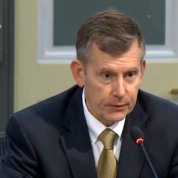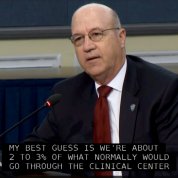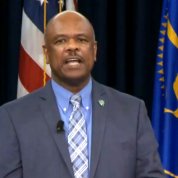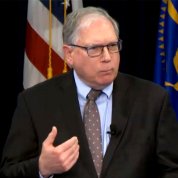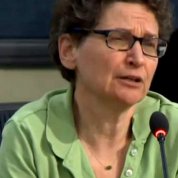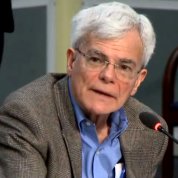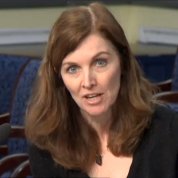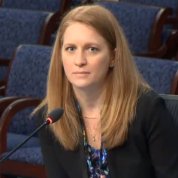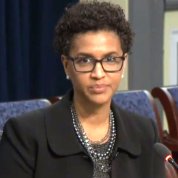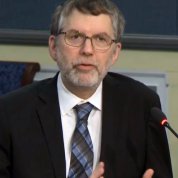Virtual Town Hall Draws Tens of Thousands of Viewers
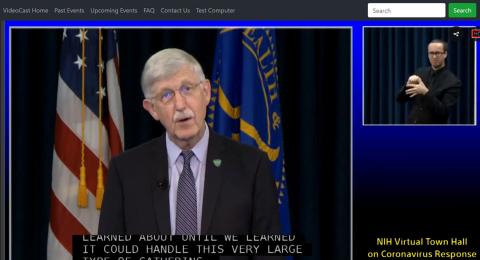
On the same day NIH announced that most of the Intramural Research Program would be reduced to a maintenance-only operation due to spread of the novel coronavirus, NIH director Dr. Francis Collins led an online virtual town hall meeting that drew more than 23,000 viewers and generated close to 2,000 emailed questions.
The Mar. 20 event in Wilson Hall included 30 minutes of presentations by NIH leadership and an online-interactive Q&A session for the rest of the hour that answered 19 questions.
“We at NIH are doing everything we can to continue to pursue our mission,” said Collins, noting that one of his teleconferences from home had been interrupted by his cat’s sneezing fit. “It’s been a weird week, I grant you.”
Takeaways from the session included:
- The decision to put the IRP into hibernation for all non-critical functions was made to lower physical proximity, Collins explained. “That’s the most dangerous thing now…We do not want to be vectors ourselves.”
- The IRP guidance extends to all laboratories, even those outside Bethesda.
- The requirement to telework for eligible NIH’ers is now extended from Apr. 3 to at least May 1. Supervisors have been asked to use maximum flexibility in managing telework.
- It has been necessary to cancel the Summer Internship Program for young trainees at NIH for 2020.
- NIH’ers should be ready to share information about how to keep safe from coronavirus with their neighbors, Collins suggested.
- Six NIH’ers had tested positive for COVID-19 disease as of Mar. 20. [There were 54 by Apr. 3.] All have been asked to self-isolate and remain in contact with the Occupational Medical Service, which has added 22 staff to handle screening and calls.
- The Clinical Center, which began screening all patients and visitors on Mar. 13, has drastically reduced its census of both inpatients and outpatients and has cut its normal social traffic by more than 90 percent.
Asked how long social distancing—though Collins prefers the term physical distancing—will last, Collins said it hurt to send his own lab’s staff home that day.
“I don’t know how long it will last,” he said. “We can’t tell with any precision at this point.” Much wider testing will be available soon, he noted, predicting, “We will probably have 4 to 5 times the number of cases we have now in a few weeks. It will be at least a month before we can tell whether social distancing is working. I have no crystal ball.”
The session had been scheduled to include NIAID director Dr. Anthony Fauci, who has become the nation’s chief medical authority on COVID-19 and has been a ubiquitous presence on the national news. But he was at the White House’s daily press conference, Collins explained. “Even Tony can’t be in two places at once.”
Collins concluded, “It’s been a unique experience to do this virtually—I wish I could see all of you out there…There is no question that this is an unsettling time…But I am quite confident that we will get through this together. There will be stories told about this period in history for decades, maybe even centuries.”
He reminded the audience that NIH also stands for the National Institutes of Hope: “That’s what we are, after all, and I think we should claim that.”
Quoting an editorial in that day’s newspaper that included the observation that “the only thing more contagious than a virus is hope,” he urged, “Be contagious with hope—to your neighbors, to your colleagues and in the mirror, to yourself.”—Rich McManus

